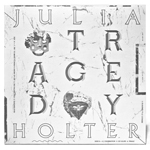|
|
 |
Dusted Reviews
Artist: Julia Holter Album: Tragedy Label: Leaving Review date: Jan. 18, 2012 |

|
|
|
 |
From the opening “Introduction,” you can tell that Tragedy is a bold and ambitious album. Over the course of three minutes, an eerie foghorn and opera singer in full song dissolve into muted strings, ghostly choirs and tape hiss, as the album’s dark, weird context takes shape. I’m not sure any other album released in 2011 debuted with such bravura.
The tense and dark atmosphere continues to percolate, not least on stand-out “Try to Make Yourself a Work of Art,” a loping, industrial-strength rock monster on which Holter comes on like a female Michael Gira, her voice pitched midway between Nico at her most dramatic and a more emotional Siouxsie Sioux. With its rugged percussive drive and indie-rock oomph, “Try to Make Yourself a Work of Art” wouldn’t sound out of place on a Religious Knives album, which is some compliment. Meanwhile, “The Falling Age” is a melancholic piano-based ballad with underlying synth drones and airy vocals, but which slowly devolves into grumpy organ rumbles and deep bass lines. Such dramatic shifts in style occasionally undermine the album’s coherence, but at its best, Tragedy is a dramatic and involving conceptual work.
As its name and album cover suggests, Tragedy is strongly influenced by ancient Greek theatre, notably the play Hippolyte. The themes of anger and lust in that play become recurring memes throughout Holter’s songs, but the constant stylistic meanderings make it hard to focus on this central theme. For example, “Goddess Eyes,” which contains perhaps the album’s most explicit lyrics, is a Laurie Anderson-inspired synth-pop jaunt, complete with 1980s drum machine beats and Vocoder’d vocals. The transition between this and the following song, “The Falling Age,” is such a wrench that it threatens to undo the intense atmosphere woven during the preceding 20-odd minutes. “Celebration,” meanwhile returns to the hazy abstraction of “Introduction,” with odd sounds and shifting melodies juxtaposed against Holter’s voice, the track building up before being deconstructed and re-built in another style.
I don’t mean to poo-poo the breadth of styles and ambition present on Tragedy. It truly does stand alone among the records I heard in 2011. It may overreach itself at times, and become frustratingly unfocused, but too many ideas is a forgivable flaw. Tragedy showcases a brave and vibrant talent who is destined to do greater things in 2012.
By Joseph Burnett
|







